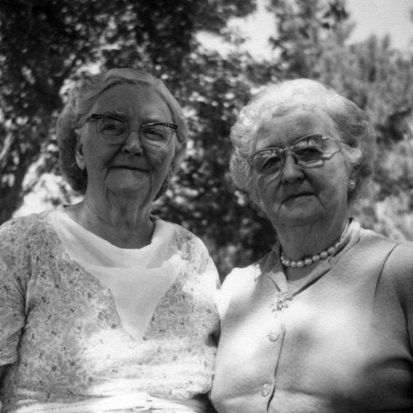ALPHA MAE HAYWORTH STONER
Requiem to a Grandmother
by Bonnie Speer
I dreamed about my grandmother last night. She sat in her rocking chair making doll clothes. I woke with a start and thought how typical that Grandmother would be busy, making something to bring cheer to others, for that’s the way she was.
Grandmother has been dead a year now. Her memory comes back fresh to me. How well I remember all the little things she did. At the age of 62, she got her first job so that she could draw a Social Security pension. The job was taking care of an invalid woman in Woodward, which lasted for several years. Grandad stayed in Fargo, living alone and raising cane about the old woman’s shenanigans.

A large part of the money that Grandma earned went onto a new sewing machine, one for which she had yearned for, for years; one that would make fancy stitches. Grandmother set to work on the machine at once, making things for others. Garments, tea towels, dolls, quilts, etc. rolled from under the needle in assembly line fashion, especially as Christmas neared.
Grandmother was a good woman; always patient and kind. I never knew anyone who had a gripe against her – unless it was Grandad. But then he had a grip against almost everyone, so that didn’t count much.
I remember those early days on the homestead place south of Fargo. It was during the depression, and we lived nearby as did Uncle Bunny (Charles). For a time, we lived there in a converted truck with a house on the back. Mother helped Grandma wash on an early-type washing machine. They climbed the porch roof and spread apples to dry in the sun. Grandma scrubbed her floors and worried about her children.
Even those days, Grandma was good at creating things out of nothing. Her handicrafts filled her house. Bits of tinfoil framed pictures cut from magazines. She cut tin coffee cans into flower baskets for Decoration Day, or molded them from phonograph records. Her crocheted tiebacks held back sheer curtains. Acorns and nuts became whimsical animals in Grandma’s clever hands. She loved potted plants too, and filled her windows with them.
Grandma’s kitchen was often filled with spicy smells. I remember the breakfasts that she cooked. When Grandad, Great-Grandad and Uncle Bunny sat down at her big round-oak, oilcloth-covered table, they invariably found it spread with hot biscuits, thick slices of home-cured bacon, butter, jams and eggs. Plus, home-canned apples seemed a permanent part of Grandma’s meals, displayed in her prized, covered, cut-glass bowl.
January and February are cold days in the Oklahoma plains. The raw north winds sweep across the prairie lands and Wolf Creek. People huddle in their houses, grumbling and wishing for spring. Grandma, however, seldom grumbled. Instead, she passed the time with her handicrafts which she sometimes took to one of the Methodist Church bazars.
The winter months was also a time when perused her seed catalogs. Invariably they arrived when the weather was its worst, which helped. Grandma would study their bright pages of flowers, shrubs and vegetables, and dream of spring when she could again be out in her garden. I’m sure that her order was probably one of the first into the nursery office each year.
Grandma liked trying out new plants, climbing roses, yellow tomatoes, etc. When her seeds came, Grandma planted them about March in wooden tomato boxes filled with dirt. She watched them grow and transplanted the delicate plants as they became too big for the bedding flats. When the ground warmed, during the last of April or first of May, Grandma’s stout body could be seen hoeing the earth, making straight rows to plant the new spring seedlings.
Spring can be a harsh time in Oklahoma too. The strong north winds turn to the south and blow even stronger day in and day out. The wind dries out the soil, and then picks it up and hurls it at the tiny plants. The hardy few that survive are apt to be buried by sand. To stave off the destruction of her plants, Grandma carried bucket after bucket of water to pour on their thirsty roots.
She loved her flowers. She didn’t just plant flowers, she created gardens for them. Anything that sat still became a useful flower pot: an old wash pan, an oil pan or old worn-out tires. Also, rocks, brick or local fieldstone became creative material in her adept garden hands.
One of my fondest places to play as a child was in an old Model-T Ford body which sat in the yard. When Grandad refused to haul it off to the junk pile, Grandma converted it into a playhouse for visiting grandchildren. Nearby she let her imagination run wild and dug a ditch for a tiny, winding stream and built a bridge over it. Of course, the stream didn’t have water in it except when Grandma filled it with a the garden-hose, but at other times we children used our imaginations.
Along the bank, Grandma planted flowers. Beneath the two tall trees she hung a hammock. She said she had always wanted a nice place to rest in the cool of the evening. She seldom got a chance to use the hammock because she was always so busy. When she wasn’t, she usually found Grandad or one of us grandkids in the hammock.
Yes, Grandma’s been gone a year now. I miss her. But I am grateful for many things she did for me in my life. She set an example that one doesn’t have to be discouraged by one’s surroundings. She taught me, as well as many others, that by being a loving and positive person one can bring cheer into one’s own life as well as that of others.
(Written January 1967, Simi Valley, California.)
Bonnie Lou Stahlman Speer (1929-2000) was a second cousin of Webmaster Donald Erwin